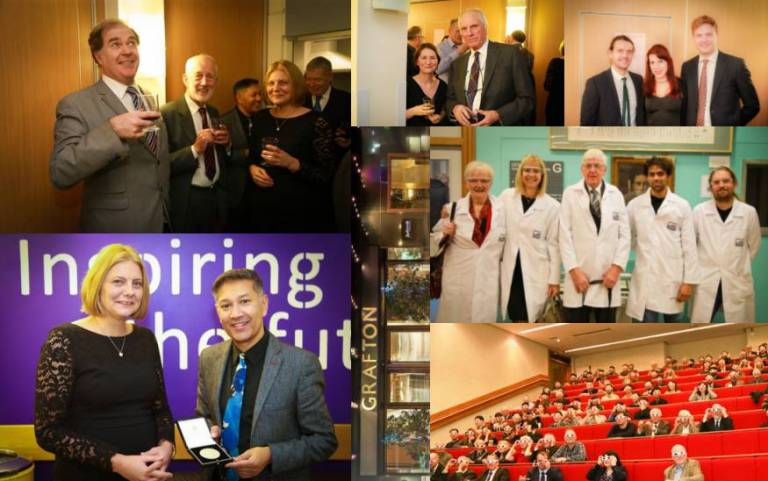Chemistry Lab Dinner 2017
22 November 2017–22 November 2019, 4:30 pm–10:45 pm

The dinner took place on Friday 24th November 2017 at the Radisson Blu Edwardian Grafton Hotel and was attended by 68 people (Alumni, Staff and Students).
Event Information
Open to
- All
Availability
- Yes
Organiser
-
Louise Msceveny
The pre-dinner lecture was given by Professor Saiful Islam, University of Bath, titled ""Atomic-Scale Insights Into Energy Materials (Batteries Included)", which was an excellent start to the evening and well attended. Guests were offered 3D glasses to participate in the lecture which looked at the next generation of clean energy technologies, the development of new materials is crucial. This talk highlighted the use of advanced modelling and structural techniques to gain new insights into the chemistry of materials for lithium-ion batteries and perovskite solar cells.
Our after-dinner speech was given by the department’s latest Fellow of the Royal Society, Professor Sarah (Sally) Price FRS. Sally was appointed to the academic staff as a lecturer (1989), she progressed to Reader (1996) then to Professor (2000). A major career step was successfully leading a bid to the Research Councils UK in 2003 for the Basic Technology project “Control and Prediction of the Organic Solid State (CPOSS)”, to validate and develop crystal structure prediction methods by collaboration with leading experimental work on the same compounds. This collaboration involved Derek Tocher and Richard Catlow as UCL Chemists, pharmaceutical scientist Alastair Florence in Strathclyde, Kenneth Harris and Maryjane Tremayne (ex-UCL Chemists then in Birmingham), facilities crystallographers Bill David and Chick Wilson, and Maurice Leslie (the main developer of DMACRYS at Daresbury).
We also had a talk from Dr Gemma Louise Davies, the CPS President highlighting the events of the past year and talking about the future works of the CPS and how you can get involved. Gemma recently joined us from Warwick University as a Lecturer in Materials Science.
Professor Claire Carmalt presented Marco Sabatini the Ramsay Medal for his presentation entitled “Borate Esters: Simple Catalysts for the Sustainable Synthesis of Complex Amides”.
His supervisor, Dr Tom Sheppard had this to say about Marco “Marco began his PhD at UCL in 2014, having completed his MChem degree at the University of Bath earlier that year. In a PhD project in funded by UCL Chemistry and GSK, he has been working on the development of new methods for amide synthesis, an important challenge in synthetic chemistry. Whilst the synthesis of amides is often viewed as a ‘solved problem’, there are many drawbacks of the existing methods. Most importantly, they are extremely inefficient, usually requiring high molecular weight, and often toxic, reagents that lead to the generation of large quantities of waste products. The development of solutions to these problems has been highlighted as an important challenge by chemists working on the large-scale synthesis of industrial products such as pharmaceuticals.
Marco’s research has focused on the development of new catalytic methods for forming amides, directly from readily available carboxylic acids and amines. In principle, if this reaction can be achieved efficiently with a catalyst, the only by-product is water. During his PhD, Marco developed a new method for amide formation which uses simple commercially available borate esters as catalysts. Unlike other catalytic methods for amide formation, the reaction can be applied to the synthesis of a wide range of amides, including industrially relevant compounds such as intermediates in pharmaceutical synthesis. The method is highly efficient in terms of the small quantities of material inputs required (solvents, catalyst, etc), which hopefully should lead to its application on industrial scale. To date, his work has been published in the leading international journals Science Advances and Chemical Communications, and he has presented it at both national and international conferences. In further unpublished work, Marco has carried out a detailed investigation of the possible mechanisms of boron-mediated amidation reactions in general, which should aid the design of even more efficient catalysts in the future.
Marco has been an outstanding PhD student, who has been extremely productive during the three years of his PhD and has developed into an excellent scientist. He is therefore a very worthy winner of the 2017 Ramsay Medal”.
 Close
Close

